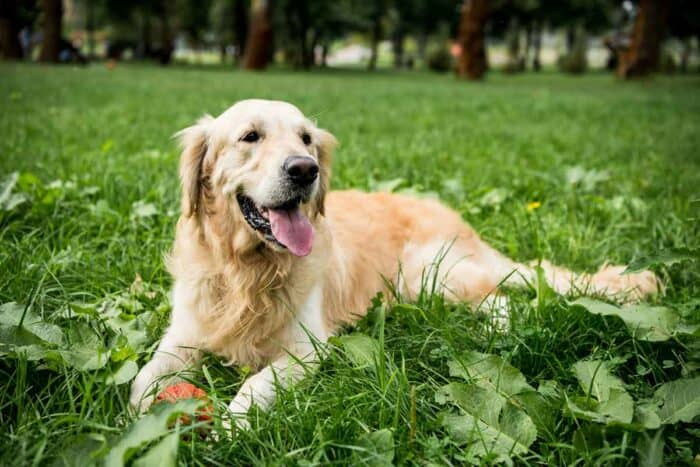This post may contain affiliate links. We may earn money or products from the companies mentioned in this post.
There are five main differences between Golden Retrievers vs. Goldendoodles.
Thankfully, most of these differences are skin deep and do not affect how your dog will interact with you or how it will fit in with your family or lifestyle–they just come down to your personal preference.
However, these two breeds’ coat types and their overall temperament differences can have a significant impact on how they would fit into your home.
For example, Goldendoodles and Golden Retrievers both suffer from anxiety, but the anxiety is caused by different things and expressed in different ways.

Overall, Golden Retrievers and Goldendoodles are incredibly similar dogs and differ in small yet important ways.
To make sure you get the dog that fits into your heart and home the best, let’s take a closer look at what makes these dogs unique!
Main Differences Between Golden Retrievers vs. Goldendoodles
The main differences between Golden Retrievers and Godlendoodles are:
- Golden Retrievers are a recognized dog breed originally from the Scottish Highlands, whereas Goldendoodles are a designer, or hybrid, dog.
- Golden Retrievers weigh between 55 and 75 pounds on average, whereas Goldendoodles weigh between 60 and 90 pounds on average.
- Golden Retrievers come in a limited variety of colors, whereas Goldendoodles can come in a vast range of colors depending on their Poodle parent.
- Golden Retrievers have a short undercoat and a longer, straight outer coat, whereas Goldendoodles can have a curly, wavy, or straight coat.
- Golden Retrievers are fun-loving dogs that are very carefree, whereas Goldendoodles retain some of their Poodle aloofness and can be nervous around large groups.
Golden Retrievers vs. Goldendoodles: Introduction
Golden Retrievers are a recognized breed of dog by the American Kennel Club.
The Golden Retriever is a well-loved goofball and is ranked as the third most popular dog in the US!
On the other hand, Goldendoodles are designer or hybrid dogs. They have a Poodle parent and a Golden Retriever parent.
They’re the perfect combination of the two dog breeds, and the result is a large dog that is mostly hypoallergenic, loves cuddles and exercise, and is highly intelligent.
1. Golden Retrievers vs. Goldendoodles: Origins
The origin of a dog breed has a lasting impact on both its appearance and temperament.
That is why it’s important to take a look at where your dog breed came from so you’re better informed of their physical and mental needs and how to best care for them.
Golden Retriever
Golden Retrievers were originally bred in the 1800s in the Scottish Highlands as the perfect gun dogs.
They would go on hunts with their owners, and once the gun was fired at prey, the Golden Retriever would run after it and bring it back, or ‘retrieve’ it for their owner.
Golden Retrievers are also known as ‘soft mouths’. These dogs were bred to have a large mouth that was gentle on the prey item that they retrieved for their owners.
They could retrieve ducks, quails, or hares quickly and efficiently without damaging the prey.
Today, Golden Retrievers are popular service and therapy dogs and work in many different fields to aid humans.
Goldendoodle
People saw how beneficial the hypoallergenic Poodle was and wished they could create a dog that was hypoallergenic but had a more laid back, goofy attitude.
As a result, they bred the Poodle and the Golden Retriever together and made the Goldendoolde!
Goldendoodles were first widely bred in the 1990s.
They soon became incredibly popular in the 1990s and 2000s as large companion dogs that are intelligent, slightly hypoallergenic, and have some of the lovable, chuckle-head nature of the Golden Retriever.
2. Golden Retrievers vs. Goldendoodles: Weight
Golden Retrievers and Goldendoodles are similar in terms of height. However, the Doodle almost always outweighs the parent dog breeds.
Golden Retriever
Golden Retrievers average between 55 and 75 pounds. Females will be on the lighter side, and males will be on the heavier side.
By no means small or light, they’re still outweighed by the Goldendoodle, even though the Poodle parent normally weighs less than the Golden Retriever parent.
Goldendoodle
Goldendoodles can be bred using a standard, medium, or miniature Poodle, and this will affect the size of the eventual Doodle.
Standard Goldendoodles weigh between 60 and 90 pounds on average! Females will weigh in on the lighter side, and males tend to be on the heavier side.
Medium and miniature Goldendoodles can weigh anywhere between 10 and 40 pounds depending on the size of the Poodle parent and if they’ve been back bred with other medium and miniature Poodles to strengthen their Poodle genes.
3. Golden Retrievers vs. Goldendoodles: Coat Color
Goldendoodles share their parent’s coloration, which means they take on a lot of the standard Poodle colors as well as the Golden Retriever colors (even though they are called ‘Golden’ Doodles).
Golden Retriever
Golden Retrievers come in a small variety of colors. They can be a very light cream color and then run the full golden gamut all the way to fox-red or auburn. Golden Retrievers do not have any markings or color combinations.
As a Golden Retriever ages, they don’t go gray or lose their color! Instead, their color will actually deepen over time.
Goldendoodle
Goldendoodles can be almost any color that occurs in doggy nature!
They can take on the coloration of their Golden Retriever parent or their Poodle parent, or somewhere between. They have a much wider range in colors compared to typical Golden Retrievers.
Poodles can come in many colors, such as:
- White
- Black
- Blue (dark gray)
- Auburn (red)
- Cream
- Cafe Au Lait
- Brown (chocolate)
- Silver
Goldendoodles can be any of these colors, too!
Goldendoodles do not have any markings or color combinations in them unless they were bred with a cross breed Poodle parent that had similar markings or color combinations.
For example, if a chocolate Poodle was bred with an auburn Golden Retriever, then the resulting Goldendoodle could be brown, red, or any version of gingery goodness in between!
4. Golden Retrievers vs. Goldendoodles: Coat Texture
Poodles and Golden Retrievers have very different coat textures. They can combine in strange ways when the Goldendoodle is produced, and it’s almost never certain what you’re going to get.
Golden Retriever
Golden Retrievers were bred to have a dense undercoat that kept them warm in the cold Scottish Highlands.
This dense undercoat sheds seasonally, which means your Golden Retriever needs to be brushed twice a week throughout the year and every day while they’re shedding to avoid matting and compaction, which is very painful for the dog.
Golden Retrievers have a long, straight outer coat that is meant to protect their delicate skin from the brambles and thorny underbrush as they run through the vegetation after their owner’s shot prey.
Goldendoodle
Goldendoodles can share the long, straight coat of their Golden Retriever parents, or they can have a wavy coat which is a combination of the Golden Retriever and the Poodle coat, or they could even have a tightly curled coat like their Poodle parent.
It all comes down to what genes get turned on from which parent in the womb!
Goldendoodles are more likely to have a curly coat than a straight coat unless they’re bred back with Golden Retriever parents to strengthen their Golden genes.
Their coat requires brushing every second day, as it will tangle, mat, and become compacted easily.
At first, this can seem like a lot of maintenance. However, they do not shed nearly as much as Golden Retrievers do, so the daily clean up of dog hair on the couches is cut down considerably!
5. Golden Retrievers vs. Goldendoodles: Overall Temperament
The overall temperament of a dog breed is important to understand because some dogs are better suited to specific lifestyles.
Still, all dogs are unique and they all have their own individual personalities. Their temperaments are not set in stone from birth, and training and socialization are important in shaping who they are.
However, certain breeds are predisposed towards certain behaviors because these behaviors have been bred into them for centuries!
Therefore, it’s important to understand what you may be getting yourself into by bringing a specific breed into your heart and home.
Golden Retriever
Golden Retrievers are absolute goofballs. They are dopey, friendly, fairly laid-back dogs that love to laze about, cuddle with their owners, go on adventures, and will go out of their way to please you in any way that they can.
They are highly intelligent and sensitive dogs, which is what makes them excellent service animals.
Unfortunately, Golden Retrievers are very dependent on their owners and tend to suffer from separation anxiety if they are left alone for extended periods of time throughout the day.
If your job is a 9 to 5 everyday with frequent late nights and no one is home to check in on your Golden Retriever, then you may be setting yourself up for disaster.
Golden Retrievers do very well with children and other animals and have almost endless patience for being loved on by small humans and needy canine friends.
Goldendoodle
Goldendoodles can be just as fun-loving, excitable, crazy about children, and cuddly as the Golden Retriever. However, they do seem to retain their Poodle parent’s need for some independence and quiet, prideful aloofness.
Goldendoodles don’t always do well with other dogs, as they don’t like the competition that other animals bring.
They also sometimes do not do well with crowds of people, as they can suffer from social anxiety, which can translate into perceived aggression even though they are acting out of fear and not anger.
FAQs About Golden Retrievers vs. Goldendoodles
Which is the healthier dog? Goldendoodles or Golden Retrievers?
Golden Retrievers and Goldendoodles share almost all of the same health concerns. Neither dog is more or less healthy than the other in terms of what they are and are not predisposed to.
However, hybrid or crossbreed dogs are generally more resistant to genetic issues, as they have more genetic diversity in their makeup.
Goldendoodles and Golden Retrievers are both predisposed to:
- Eye issues such as pigmentary uveitis, progressive retinal atrophy, and cataracts
- Cardiovascular issues such as aortic stenosis and Von Willebrand’s disease
- Neurological issues such as epilepsy
- Joint issues such as hip and elbow dysplasia
Even though these dogs are predisposed to these issues, it’s not a given that they will get sick!
With a healthy diet, prophylactic supplements, regular vet check-ups, and a solid exercise regime, many of these issues can be avoided entirely.
Are Goldendoodles or Golden Retrievers easier to train?
Golden Retrievers and Poodles are both incredibly intelligent dogs, which means their Goldendoodle offspring are equally as intelligent!
Early socialization and training is important for both the Golden Retriever and Goldendoodle.
Starting early and working with them constantly will help stave off the Golden Retriever’s separation anxiety and the Goldendoodle’s social anxiety.
Do Golden Retrievers or Goldendoodles live longer?
Golden Retrievers typically live for 15 to 18 years, and Poodles typically live for 10 to 14 years. Goldendoodles can land anywhere in the mix.
However, they are more likely to have an average lifespan similar to the Poodle and live for 10 to 12 years, as they are larger dogs, and larger dogs do not live as long as smaller breeds do.
Are Golden Retrievers or Goldendoodles more active?
Golden Retrievers are incredibly active, and so are Goldendoodles! Both dogs need at least 45 minutes of exercise a day in the form of play time, walks, or active training.
They are both highly intelligent and will become destructive if they are stuck sitting at home with pent-up energy.
Rolling Over On Golden Retrievers vs. Goldendoodles…
Golden Retrievers and Goldendoodles are very similar dogs.
They share many of the same personality traits, are almost the same size, and will cost you similar amounts both at point of purchase and throughout their lives.
Although they share many characteristics, there are some key differences between the two dogs:
- Breed origin
- Weight
- Coat coloration
- Coat texture
- Overall temperament
Carefully analyze the differences between these two dogs before deciding which is the best for your lifestyle so their needs are met and your life still runs smoothly!
Good luck in choosing the best breed for your lifestyle.
Save To Pinterest

Top Picks For Our Puppies
- BEST PUPPY TOY
We Like: Calmeroos Puppy Toy w/ Heartbeat and Heat Packs – Perfect for new puppies. Helps ease anxiety in their new home. - BEST DOG CHEW
We Like: Bones & Chews Bully Sticks – All of our puppies love to bite, nip, and chew. We love using Bully Sticks to help divert these unwanted behaviors. - BEST DOG TREATS
We Like: Crazy Dog Train-Me Treats – We use these as our high-value treats for our guide dog puppies. - BEST FRESH DOG FOOD
We Like: The Farmer’s Dog – A couple months ago we started feeding Raven fresh dog food and she loves it! Get 50% off your first order of The Farmer’s Dog.
Check out more of our favorites on our New Puppy Checklist.


